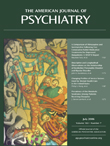To the Editor: Dr. Thombs and colleagues suggest that part of our results may be due to collinearity, i.e., that the somatic/affective and cognitive/affective factors would be so closely correlated that entering them both in a multivariate model would produce uninterpretable results. I believe that this is not in accordance with our data, and I will present two analyses in support of our view.
First, the differential relationship of the somatic/affective and cognitive/affective factors with cardiac prognosis is not due to only one or two items as Dr. Thombs and colleagues suggest. We calculated the univariate associations of all individual Beck Depression Inventory items with cardiac death and found that the items for dissatisfaction, indecisiveness, work difficulty, fatigability, and loss of libido had significant effects. It is noteworthy that all of these items are covered by the somatic/affective factor and that only dissatisfaction and indecisiveness have secondary factor loadings on the cognitive/affective factor (but the highest factor loadings on the somatic/affective factor). In contrast, items such as failure, guilt, punishment, and self-accusations were associated with a (nonsignificant) decreased risk.
Second, to rule out the possibility that our multivariate analyses produced biased results, we compared the occurrence of cardiac death in the following four subgroups: 1) low scores on both factors (N=300), 2) high scores on the somatic/affective factor (highest 20%) but low on the cognitive/affective factor (N=24), 3) high scores on the cognitive/affective factor (highest 20%) but low on the somatic/affective factor (N=34), and 4) high scores on both factors (N=57). We found event-free proportions of 3.0%, 12.5%, 0.0%, and 7.1%, respectively, and we concluded that the presence of cognitive/affective symptoms of depression does not lead to an increased risk (and even seems protective), while the presence of somatic/affective symptoms does.
In our two samples, we found substantial factor intercorrelations (0.70–0.72), just like Dr. Thombs and colleagues reported in their data set. However, based on the above, we determined that these correlations did not bias our multivariate results. Despite the overlap, the specific characteristics of the somatic/affective factor seem to result in an increased risk of cardiac death, while the specific characteristics of the cognitive/affective factor seem to result in a decreased risk. This finding is of importance in understanding the effect of depression on cardiac prognosis and may guide our efforts to reverse these outcomes.

